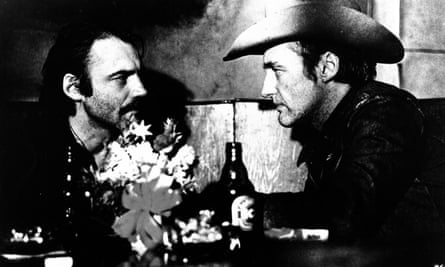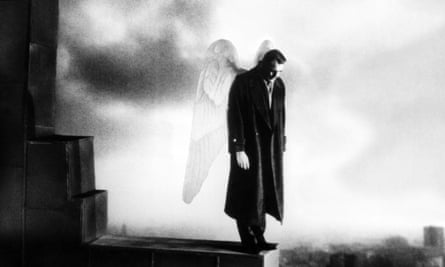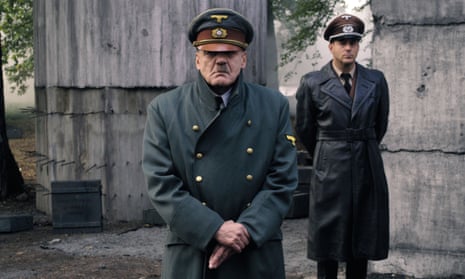The Swiss actor Bruno Ganz, who has died aged 77 from cancer, was a wise and contemplative presence, as familiar, consoling and crumpled as a favourite overcoat.
He came to prominence in three films by the director Wim Wenders. In The American Friend (1977), adapted from Patricia Highsmith’s novel Ripley’s Game, he was a shy picture-framer who is persuaded, under the misapprehension that he is dying, to become an assassin in order to provide for his family.
In Wenders’ philosophical love story Wings of Desire (1987), set in pre-unification Berlin, he played an angel who decides to become mortal after falling for a female trapeze artist. Ganz’s performance was touching and characteristically understated; he returned to the role in the inferior sequel Faraway, So Close! (1993). Meanwhile, Nicolas Cage donned Ganz’s wings for City of Angels (1998), the inevitable Hollywood remake of the Wenders original.

Given Ganz’s gentleness, it is ironic that millions of viewers came to know his work only from a snippet showing him at his most enraged. In Downfall (2004), he gave a rounded and highly considered portrayal of Adolf Hitler during the final days of the dictator’s life.
A clip of Ganz in the part, ranting and raving in his bunker, became an internet sensation, with the subtitles adjusted repeatedly to make it appear that he was fulminating on some crisis of the day – the relegation of Newcastle United, say, or the shortcomings of the latest games console or mobile phone.
While acknowledging the creativity of this trend, and its part in widening his appeal (“They’ve made me more popular than I could ever have imagined”), Ganz expressed reservations: “You have to understand I put everything into that performance so it’s not easy for me to accept it.”
Indeed, he went to great pains in Downfall to show Hitler as a tormented and nuanced individual racked with insecurities and quivering with tremors from Parkinson’s. Joachim Fest, the German historian whose book Inside Hitler’s Bunker was one of the film’s source materials, said of Ganz’s performance: “That really is Hitler.”
Ganz was born in Zurich, the son of a Swiss mechanic and his northern Italian wife. As a teenager he attended drama school and later worked as a bookseller, as well as training to be a paramedic. He left Switzerland in the early 1960s to become a stage performer in Göttingen and Bremen, playing Hamlet in 1965, a role he was to reprise 17 years later.

In 1970 he co-founded with Peter Stein the alternative theatre company Schaubühne. “Clearly we were actors and theatre people, but we understood ourselves as being part of 1968,” he said. “It was definitely leftwing theatre.”
Some of their productions were adapted for television, such as Brecht’s Die Mutter and Ibsen’s Peer Gynt (both 1971), but it was Ganz’s performance in the 1976 television version of Max Gorky’s Summerfolk that launched his wider film and TV career.
In the same year he starred in Eric Rohmer’s 18th-century drama The Marquise of O. After The American Friend, he was cast alongside Laurence Olivier and Gregory Peck in the trashy Nazi-hunting thriller The Boys from Brazil (1978) and as Jonathan Harker in Werner Herzog’s brooding Nosferatu the Vampyre (1979), opposite Klaus Kinski in the title role. He was a journalist reporting on the Lebanese civil war in Volker Schlöndorff’s Circle of Deceit (1981) and a dying writer in Theo Angelopoulos’s Palme d’Or-winning Eternity and a Day (1998).
In 1996 he became only the fifth actor in more than a century to receive the illustrious Iffland-Ring, given to the “most significant and most worthy actor of the German-speaking theatre”. He won the Donatello award for the gentle Italian comedy-drama Bread and Tulips (2000), and was also seen in Jonathan Demme’s remake of The Manchurian Candidate (2004), Francis Ford Coppola’s eccentric fantasy Youth Without Youth (2007), the thriller The Baader Meinhof Complex and the Oscar-winning Holocaust drama The Reader (both 2008).

In 2002 he was the subject of a documentary, Behind Me, which captured him at work on Stein’s ambitious 15-hour staging of both parts of Goethe’s Faust, in which the roles of Faust and Mephistopheles were each split between two actors. Ganz and Christian Nickel shared Faust, though it was the former, with 75% of the dialogue, who was generally agreed to be the production’s dominant force. During rehearsals he fell off a ladder, breaking his wrist and pelvis and missing the July 2000 premiere in Hanover but rejoining it in Berlin at the end of the year.
The production was disliked by German critics, though Ganz was singled out for praise. “Like the greatest singers, [he] understands how to bring the well-known tones to new, spontaneous life,” said Frank Busch in the Frankfurter Allgemeine Zeitung newspaper.
Ganz was an actor who never failed to raise the quality of the films in which he appeared, no matter how small the role. Among notable recent work was Unknown (2011), where he played an ex-Stasi officer and brought to this ludicrous Liam Neeson thriller a dose of gravitas and dignity, not least in a poignant scene with Frank Langella as the operative who means to kill him.
In The Counselor (2013), directed by Ridley Scott from a script by the novelist Cormac McCarthy, he was a jeweller with a nice line in ruminative patter: “To enhance the beauty of the beloved is to acknowledge both her frailty and the nobility of that frailty,” he tells a customer.
In Sally Potter’s spiky comedy The Party (2017) he was amusing as the wishy-washy life coach and healer forever being disparaged by his wife (Patricia Clarkson). And in Lars von Trier’s gruesome drama The House That Jack Built (2018), he played Virgil (“Virge” for short), who guides a serial killer (Matt Dillon) through purgatory. His soothing tones were heard throughout the movie, though his face was not shown until the final sequence.
One of the last films he appeared in was Radegund, the story of a German conscientious objector in the second world war, directed by Terrence Malick in 2017 and apparently still in its lengthy post-production process.
He is survived by his partner, the photographer Ruth Walz, and a son, Daniel, from his marriage to Sabine. The couple married in 1965, and though separated were not divorced.
